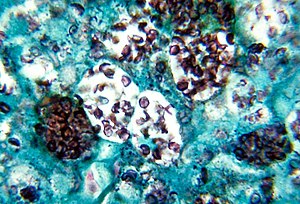Reticuloendotheliosis
| Histoplasmosis | |
|---|---|
 |
|
| Histoplasma capsulatum. Methenamine silver stain showing histopathologic changes in histoplasmosis. | |
| Classification and external resources | |
| Specialty | Infectious disease |
| ICD-10 | B39 |
| ICD-9-CM | 115 |
| DiseasesDB | 5925 |
| MedlinePlus | 001082 |
| eMedicine | med/1021 ped/1017 |
| MeSH | D006660 |
Histoplasmosis (also known as "Cave disease," "Darling's disease," "Ohio valley disease," "reticuloendotheliosis," "spelunker's lung" and "caver's disease") is a disease caused by the fungus Histoplasma capsulatum. Symptoms of this infection vary greatly, but the disease affects primarily the lungs. Occasionally, other organs are affected; this is called disseminated histoplasmosis, and it can be fatal if left untreated.
Histoplasmosis is common among AIDS patients because of their suppressed immunity. In immunocompetent individuals, past infection results in partial protection against ill effects if reinfected.
Histoplasma capsulatum is found in soil, often associated with decaying bat guano or bird droppings. Disruption of soil from excavation or construction can release infectious elements that are inhaled and settle into the lung.
If symptoms of histoplasmosis infection occur, they will start within 3 to 17 days after exposure; the average is 12–14 days. Most affected individuals have clinically silent manifestations and show no apparent ill effects. The acute phase of histoplasmosis is characterized by non-specific respiratory symptoms, often cough or flu-like. Chest X-ray findings are normal in 40–70% of cases. Chronic histoplasmosis cases can resemble tuberculosis; disseminated histoplasmosis affects multiple organ systems and is fatal unless treated.
While histoplasmosis is the most common cause of mediastinitis, this remains a relatively rare disease. Severe infections can cause hepatosplenomegaly, lymphadenopathy, and adrenal enlargement. Lesions have a tendency to calcify as they heal.
Presumed ocular histoplasmosis syndrome (POHS) causes chorioretinitis, where the choroid and retina of the eyes are scarred, resulting in a loss of vision not unlike macular degeneration. Despite its name, the relationship to Histoplasma is controversial. Distinct from POHS, acute ocular histoplasmosis may rarely occur in immunodeficiency.
...
Wikipedia
